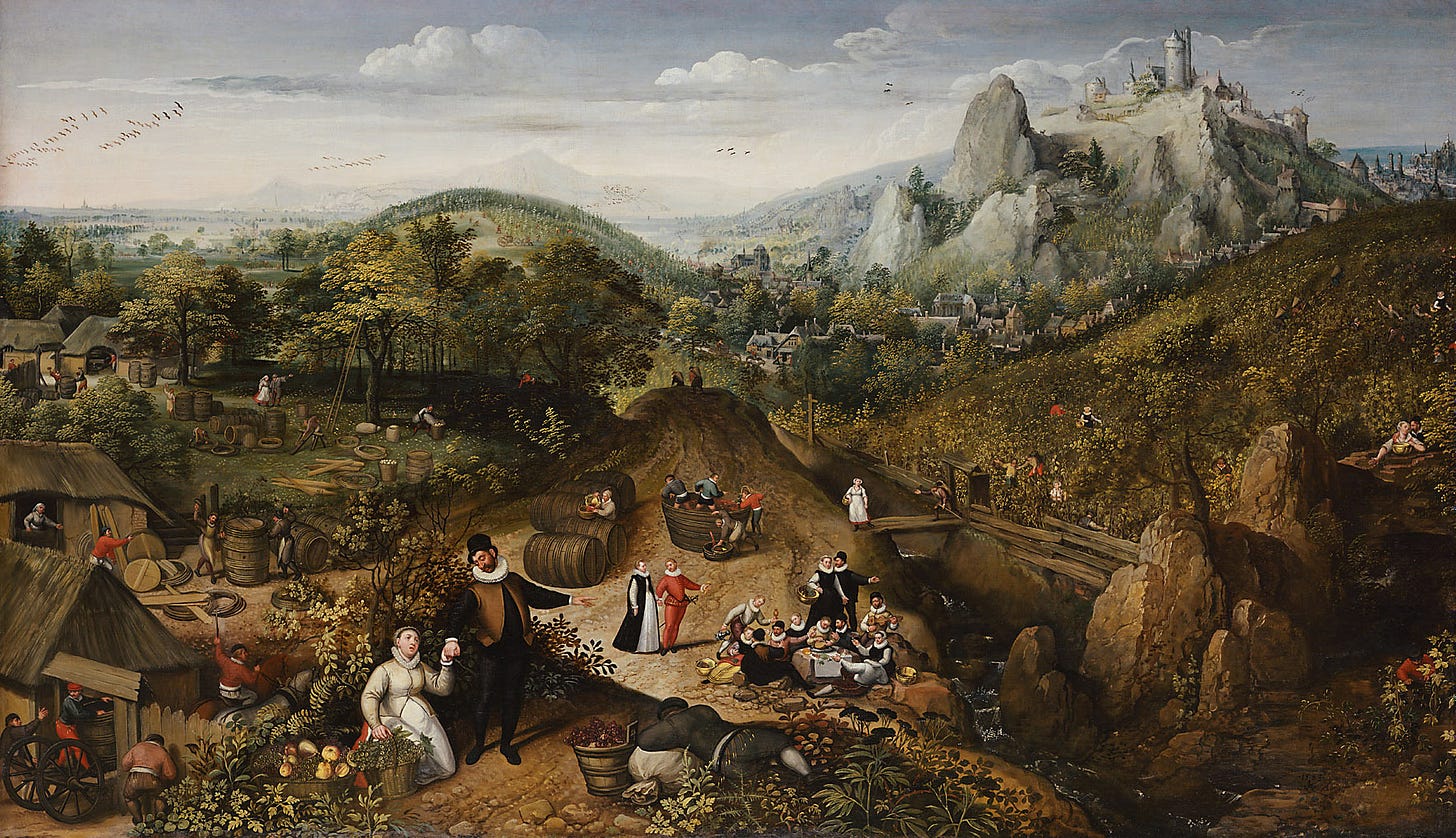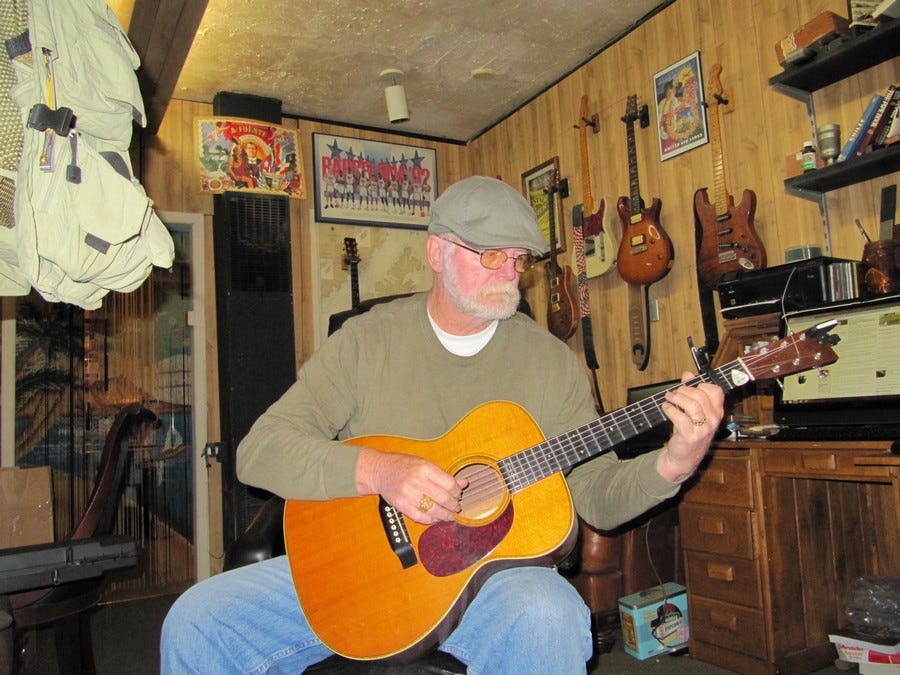For most of the year here in Oregon, the weather tends to ignore the calendar. The difference between June 30 and July 1 is not much difference at all, and so it is with March into April, November into December, and most of the other months.
But October? October is different. Each year, it feels as if September is a window that closes and locks tight. Summer has gathered her things, and swept the porch. She’s not quite gone yet, but she’s all packed and her scarf is on. Last Sunday, the Children’s Liturgy which I help lead in our little Anglican parish all circled up and sang a traditional song for Michelmas, which begins:
The Autumn wind blows open the gate,
St. Michael, for you we wait!
Despite the fact that this has been the most beautiful Autumn in my memory, that “Autumn wind” is here in the mornings and evenings, so different even from a week ago, blowing in crisp and dry from the east.
A few nights ago, we lit the first fire of the fall in Calcifer, our little woodstove, by whose snapping warmth I read out loud F. Marion Crawford’s deliciously creepy story “The Upper Berth” to the family. (This may have been a mistake, particularly since I did not consider that our ten-year-old sleeps on the bottom of a bunk bed with an empty upper bunk beside a window, a fact that those familiar with the tale will appreciate.)
The air smells different. The last roses are blooming with an admirable desperation. Blackie the Cat creeps out from the barn of the nuns next door as if he is auditioning for Halloween. The goats over the neighbor’s fence crunch fallen apples and stare at us with their witchy eyes. And it all started like clockwork when the calendar read October.
For our dispatch today, I would like to try something new, and simply share Five Good Things which are bringing me joy in this autumn month.
Good Thing #1: “Pensées,” by Megan Perry Fisher
I first became aware of Megan’s music via a brief connection through Wedgwood Circle, and was intrigued enough by her description of her music to go listen. I am glad that I did. This is a simple instrumental album, which I would describe as melodic impressionism. I think of Erik Satie as I listen to it. A bit of Liszt maybe. And of course the writings of Blaise Pascal, whose fragmentary collection of notes, doubts, “thoughts,” and eventual spasms of Christian conversion give the album its name.
It is a beautiful compostion. I am someone who tends to get “stuck” on one record for weeks or months at a time (yes Emily, it’s a hyperfixation, but in a good way, dear), and the beauty, range, and emotion of this album has rewarded (quite a few) re-listens.
It seems just right for October “thoughts,” or whatever you might find yourself doing. Pining for a drowned lover by the autumn sea? Decrying the commercialization of pumpkin as a corporately-exploited flavor? Riding a bike in slow motion through France? Waltzing with a friendly ghost? Moving to California? Solving a murder in the Cotswolds? Toiling down in the maple syrup mines? Driving the kid to soccer? Come on, I don’t know your life. Just listen to this pretty music.
Good Thing #2: “The Locust Years,” by Me
Sorry. But really. I take real delight in my writing, and I am so pleased to be nearly through the editorial process of my second collection of poetry, titled The Locust Years. You can hear me talk a little about it (and a lot about William Blake) in this recent interview with the Makers & Mystics podcast.
Often people talk about their writing or creative process as painful. While at moments I can relate, in general, I simply enjoy writing books and preparing them for my readers. I love it. Really. I take particular delight in living in rich images in my writing. Over the course of a book, I like to return with the reader to those images to inspect and poke them, to re-examine and see how they have developed. This gives a sense of weaving to my writing, and (I am told) invites readers to return over time to find more. This is a delight to write in this way. It is simply fun, because it involves a process of exploration and discovery for me before it ever gets to the reader.
In my process, I mark the manuscript by hand. I read it over and over again. I pace a lot, mostly late at night in my office, and read it out loud, and fuss and tinker. It’s all very silly seen from the outside I guess, a grown man and a pater familias shuffling around and prodding little rhymes to see if anything interesting pops out of them. But things are popping out of them, good things. And I get to be the first to enjoy them, simply and purely. Then, I get to share the better ones with you.
The Locust Years is such a natural extension of the work that I began in Bower Lodge.
From the present draft of my introduction of the book:
…This is a book of short collected poems written, mostly, between 2020 and the middle of 2024. This poetry arose during years that were difficult for many people, but that were, for reasons that are quietly and sacredly private, among the most difficult of my life.
During this time, I often thought of another passage of scripture (which you will see when you come across the title poem later in this book). It is another absurdity, worthy of laughter. The idea is that somehow, an eaten thing might come back, might be restored. Years of famine, prompted by the devastation of unimaginable clouds of locusts, had broken the spirit of God’s people. Those years—with their work, their rhythm, their hope, their life, simply were gone. Like green shoots of barley, whose freshness and tender youth will never come again; gone. And yet, the promise. I will restore to you the years that the locust hath eaten…
Some of the poems in this book were previously published in a variety of excellent publications, but a majority of them are seen for the first time here. Most of them are in metered verse, which will delight some readers familiar with my past work, and puzzle others. On that point, suffice it to say that there is a time for things to fall apart, and a time for order; a time to decompose, and a time to recompose. What you see is where I am.
A heavy book, but I feel past all that now, and celebration is beginning to come to the fore for this work. Jorge Borges once observed (in “The Garden of Forking Paths”) that the only word that cannot be used in a riddle about chess is the word chess. In a similar way, a book about a particular sort of absence might reveal itself to be a riddle about presence, might it not? A book about death might be absolutely and unequivocally about life? A book of grief might be … well, that is enough hinting. I hope that you will read this riddle for yourself when it is ready, and write to me what you think the answer to it might be.
The process of moving into edits has felt connected and surprisingly light. I am honored to be working with Joshua Hren, Mary Finnegan, and the team at the excellent Wiseblood Books. We’re planning some fun little shenanigans for preorder-ers of the book and for launch time. Look for The Locust Years next spring, and please plan to support the project if you enjoy my work. More on all this soon. In the meantime, you can always read or re-read Bower Lodge for what happened the last time I did this.
All this to say—The Locust Years is a good thing.
Good Thing #3: Plum Pudding Special Reserve
I have a saying: I tend to trust a man who keeps his vices where I can see them. In that spirit, here’s one of mine. (Kids, don’t smoke. It’s a filthy habit for poets and other degenerates.) Once in a while, a pipe of good tobacco is, for me, an aid to contemplation and friendship with the earth, and this stuff is the best (possibly even surpassing 2012-era Frog Morton, in my personal opinion, which, if you know anything about the late Frog Morton, is a sort of blasphemy).
It is expensive. It is wholly worth it. I smoke it with moderation, meditation, and sheer glee.
I get mine by the ounce from Tim’s Great Cigars in Wood Village, Oregon, which is a place that is exactly what it sounds like.
Good Thing #4: “The Plum Tree”
Speaking of plums, here is “The Plum Tree,” a new poem by A.E. Stallings in The London Review of Books.
…Fruit trees are short-lived. So we’d heard.
For years we thought its time had come;
Yet each spring bridal blossoms stirred
And each year purpled into plum.One summertime will be its last –
I think it’s this one. You do too.
It happened gradually, then fast,
As bankruptcy is said to do…
Alicia is the present Oxford Professor of Poetry, a classicist, and a brilliant formal and metrical poet. (On hearing of her appointment to the Oxford post, I made a loud, joyful noise in a Manhattan cafe.) New work from her is a treat.
Go read it slowly. Let each line fall like a leaf.
Good Thing #5: Cold Water Swimming
I did not expect to be a Cold Plunge Guy, but here I stand. A local spring-fed creek has a particular pool (my “Pool of Wonders”) to which I very much appreciate going, whenever I can, at first light, and promptly going in for a swim with the trout. The water temperature is 45-50 I’d guess, more than cold enough for that rush of stolen breath, more than cold enough to give you a “brain freeze” if you keep your head under for more than a few seconds.
I have been going down regularly since May. I half-jokingly call the whole routine The Godric Option. (Godric of Finchale was, in modern parlance, a spiritual master of the year-round cold plunge in the River Wear.) It has been wonderful for me in body, mind, and spirit. Cold water, particularly wild cold water is profoundly soulish. It puts you here. It puts you now. It requires discipline, and rewards you with juicy and delectable brain chemicals. It’s like a baptism of sorts, and feels, in the most down-to-earth sense, holy.
The water is teaching me slow and simple things. Some of them have words. Some don’t. It’s just good. And cold. Good because it is cold. Every time I get in, I think, this is a little taste of what I guess death must be like. If that’s the case, then when we take that plunge, I guess we can expect quite a rush on the other side.
For those able to safely do it, cold water swimming is a practice which I unreservedly recommend. And for all of us, remembering and celebrating the sacred and sanctifying quality of pure water is something that we all can find ways to practice and enjoy.
I hope that all this finds you well and enjoying October. May you note the good things which, I pray, are close at hand for you. Comment below if you’d like to share them with the rest of us!
-Paul










Paul, what a lovely and inspiring collection of 5 Things! I am particularly entranced by the music recommendation--thank you.
As to hearing you read your work out loud I still have memories of your sharing lo, these many years ago, at the Writers Connection in Beaverton (?) reading from "The Face of the Deep." I took it off the shelf to re read a few weeks ago. What a book!
Paul. I can’t wait to read your new poetry. That defining imagery is some I both hate and love, for reasons I bet you can imagine. I imagine in your words I’ll feel freer to love the hope rather than setting it down for being too heavy.